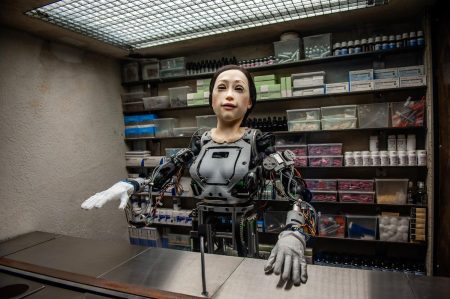A video of Florida Governor Ron DeSantis announcing that he is dropping out of the 2024 presidential race has been making the rounds on social media—but it is of course a deep fake, a video created by artificial intelligence.
It was reportedly created by satirist C3PMeme on YouTube, and subsequently posted to X and other platforms.
2024—The Deep Fake Election
It is hardly the first time such videos have surfaced on social media, and in the run-up to next year’s general election, it certainly won’t be the last. Yet, it is a disturbing reminder that some Americans could be fooled by such creations, and all of the campaigns will have to be extra vigilant in ensuring that such misinformation is addressed head-on.
“Up to this point we’ve mostly seen creations from geeks showing off their technical prowess to one another. It was all fun,” warned Dr. Jim Purtilo, associate professor of computer science at the University of Maryland.
“This deep fake of a supposed DeSantis announcement takes it to a different level,” explained Purtilo. “It reflects not just technical expertise in the manufacture of a synthetic video but also great political tradecraft. Whoever made this knew a message about Governor DeSantis dropping out of the GOP primary race would be debunked almost instantly, but nevertheless, it creates a real talking point which distracts from issues.”
Perfect Storm Of Misinformation
The technology will get better and that will only make the problem far worse. It won’t be limited to just concession speeches. AI could be used to cast a candidate in a bad light—and in the process make it hard for actual clips of seemingly bad behavior be believed. We can expect candidates caught in a compromising situation could dismiss it as a “fake”—so much so that the truth may be meaningless!
“We’ll see more deep fake videos and audios leading up to next year’s election,” added technology industry analyst Charles King of Pund-IT. “The tools and systems necessary to produce the stuff are readily available. Just as importantly, the current political climate in the U.S. is so fractured and ugly that there are large and ready audiences of people on both sides ready to believe the worst about others.”
The convergence of AI-generated videos and social media will allow such misinformation/disinformation to be created and quickly spread to the masses. Meanwhile, there may not be similar tools to counter it—while there may even be little willingness from the platforms.
“The largest danger is that many of the Internet platforms used to spread disinformation in the past don’t appear to have the interest, capacity or will to curtail it today,” King suggested. “Perhaps that will change in the coming months. If not, what already looks like an exceedingly divisive campaign could be worse than most people can imagine.”
Will The Campaigns Embrace Deep Fakes?
We’ve already seen that social media has been widely embraced by politicians, and earlier this year the DeSantis campaign even released an AI-manipulated video that included former President Donald Trump embracing Anthony Fauci. The campaign suggested the images were obviously faked, and compared them to memes circulated by Trump, The New York Times reported in June.
This week it was DeSantis who was on the receiving end.
While the newly posted video falls into the so-called “uncanny valley” where it doesn’t seem quite right, such misinformation could still threaten to derail a campaign as it is gaining momentum. This goes beyond normal campaign trickery.
“Political consultants will call this ‘building buzz’ and a thread will take on a life of its own,” Purtilo continued. “People have endless opportunities to debate whether the script was a creation of former President Trump—it was obviously made to sound like it—or some dirty tricks from another group intent on creating disarray. Some psy-ops team clearly earned their pay on this one.”
Unfortunately, we’ll likely see a lot more of it!
Read the full article here










